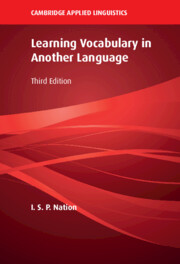Crossref Citations
This Book has been
cited by the following publications. This list is generated based on data provided by Crossref.
Farrokh Alaee, Farnaz
2022.
Effect of Bilingual-Word-List versus Semantic Network Practices on EFL Lexical Competence.
Journal of Contemporary Language Research,
Vol. 1,
Issue. 2,
p.
87.
Zhang, Haiwei
Sun, Peijian Paul
Zhang, Xueyan
Fan, Silin
and
Zhang, Yunji
2023.
A Systematic Review of Chinese Character Size Tests From 1930 to 2021.
Sage Open,
Vol. 13,
Issue. 3,
Shamshiri, Fatemeh
Shafiee, Sajad
and
Rahimi, Fariba
2023.
The Effects of Computer-assisted Language Learning (CALL) and Different Interaction Patterns on Vocabulary Development of EFL Learners.
Journal of Language and Education,
Vol. 9,
Issue. 4,
p.
110.
Hwang, Hyun–Bin
2023.
Is evidence‐based L2 pedagogy achievable? The research–practice dialogue in grammar instruction.
The Modern Language Journal,
Vol. 107,
Issue. 3,
p.
734.
Chen, Yunzhu
and
Sitthiworachart, Jirarat
2023.
Mobile Micro-Learning in English Vocabulary Learning.
p.
187.
Reynolds, Barry Lee
Xie, Xiaowen (Serina)
and
Pham, Quy Huynh Phu
2023.
The potentials for incidental vocabulary acquisition from listening to computer science academic lectures: a higher education corpus-based case study from Macau.
Frontiers in Psychology,
Vol. 14,
Issue. ,
Ha, Hung Tan
and
Nguyen, Duyen Thi Bich
2023.
Using structural equation modeling to examine the relationship between receptive vocabulary knowledge and receptive language proficiency: A new light on an old issue.
International Journal of Applied Linguistics,
Vol. 33,
Issue. 2,
p.
382.
Boers, Frank
2023.
The Encyclopedia of Applied Linguistics.
p.
1.
Xodabande, Ismail
and
Boroughani, Tahereh
2023.
Mobile-assisted focus on forms in English for academic purposes instruction: Investigating the impacts on learning academic words.
Frontiers in Psychology,
Vol. 14,
Issue. ,
Tar, Lilla
2023.
How Do They Do It? Vocabulary Learning Strategies Used by Hungarian EFL Learners with Autism Spectrum Disorder.
Folia Humanistica et Socialia,
Vol. 1,
Issue. 2,
p.
257.
Reynolds, Barry Lee
2023.
Vocabulary Learning in the Wild.
p.
1.
Wang, Tuoxiong
and
Zhang, Haomin
2023.
Examining the dimensionality of morphological knowledge and morphological awareness and their effects on second language vocabulary knowledge.
Frontiers in Psychology,
Vol. 14,
Issue. ,
Trang, Nguyen Huynh
Nguyen, Duyen Thi Bich
and
Ha, Hung Tan
2023.
Vocabulary Demands of Academic Spoken English Revisited: A Case of University Lectures and TED Presentations.
Sage Open,
Vol. 13,
Issue. 1,
Gonzalez Bravo, Camila
2023.
Vocabulary in urban contexts using multimodality.
Working papers in Applied Linguistics and Linguistics at York,
Vol. 3,
Issue. ,
Lu, Cailing
and
Dang, Thi Ngoc Yen
2023.
Effect of L2 exposure, length of study, and L2 proficiency on EFL learners’ receptive knowledge of form–meaning connection and collocations of high-frequency words.
Language Teaching Research,
Boroughani, Tahereh
Behshad, Nastaran
and
Xodabande, Ismail
2023.
Mobile-assisted academic vocabulary learning with digital flashcards: Exploring the impacts on university students’ self-regulatory capacity.
Frontiers in Psychology,
Vol. 14,
Issue. ,
Abu Al-majd, Omar
and
Belton, Barana
2024.
Which one? Technology or non-technology-assisted vocabulary learning: a probe into the state of academic buoyancy, creativity, and academic achievement.
Asian-Pacific Journal of Second and Foreign Language Education,
Vol. 9,
Issue. 1,
Li, Qiudong
2024.
Collocations, corpora and language learning.
Innovation in Language Learning and Teaching,
p.
1.
Yamagata, Satoshi
Nakata, Tatsuya
and
Rogers, James
2024.
On effective learning of English collocations: From perspectives of distributed practice and semantic restructuring.
TESOL Journal,
Vol. 15,
Issue. 2,
Han, Yining
and
Chen, Chen
2024.
Examining Chinese EFL learners’ acceptance of mobile-assisted vocabulary learning applications and its influencing factors.
Journal of China Computer-Assisted Language Learning,



